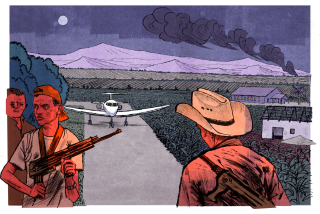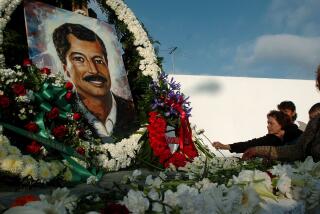Reies Lopez Tijerina dies at 88; Chicano rights movement leader
On June 5, 1967, a group of armed men, led by fiery preacher Reies Lopez Tijerina, arrived at the county courthouse in the small New Mexico community of Tierra Amarilla. They were there to free prisoners who were arrested in a land grant dispute and to place the district attorney under citizen’s arrest.
The raid was almost entirely botched.
The prisoners and district attorney weren’t there, but a gun battle broke out in which a state policeman and jailer were wounded. A judge escaped harm by using a ladder to climb into an attic and pulling up the ladder behind him.
The raiders fled, kidnapping a reporter who later got away and another man whom they let go.
The incident, as bungled as it was, vaulted Tijerina — captured six days after the raid — into the national spotlight, where he was eventually seen as one of the Four Horsemen of the Chicano rights movement, along with Cesar Chavez,, Rodolfo “Corky” Gonzales and Jose Angel Gutierrez.
His leadership role was relatively brief, but the influence of the raid lives on.
“It’s the moment that the Chicano movement became an important part of the civil rights movement,” said David Correia, a professor at the University of New Mexico.
Tijerina, 88, died Monday in an El Paso hospital. He died of natural causes after battling diabetes and heart conditions for several years, said Estela Reyes-Lopez, a family friend.
He remained a divisive figure to the end — to some a hero and to others a reckless egoist.
“Say something nasty about him or something glorious, and either way you are missing the boat,” said Lorena Oropeza, a professor at UC Davis who is writing a book about Tijerina.
The land grant issue was of particular importance to Latinos who felt vast sections of the area had been taken from their ancestors. The land had been granted to farmers, ranchers and other settlers during the time that Spain and then Mexico ruled the territory that is now the states of New Mexico, Arizona and part of California. Land grants were given to farmers, ranchers and other settlers “to be a kind of buffer against Indian tribes,” said Correia, author of the book “Properties of Violence” about the land grant movement.
The 1848 treaty that ended the Mexican-American War ceded the land to the victorious United States. The treaty originally upheld land grants, but that section was stricken by the U.S. Senate.
In the early 1960s, Tijerina took on the issue, saying that the land grants were still valid. He founded the activist Alianza Federal de Mercedes organization that staged an ever-escalating variety of protests, fueled by his religious fervor.
A charismatic speaker, his talks drew large crowds. But the courthouse action was another matter.
“Tijerina was really good at inflammatory rhetoric,” Oropeza said, “but he knew nothing about planning a military type of raid.”
In 1974, during a second trial on charges stemming from the raid, Tijerina was convicted of kidnapping and aggravated assault. He was given a maximum 10-year sentence but was paroled after about six months. He had already spent about two years in prison on convictions resulting from an earlier Alianza demonstration in a national forest campground in New Mexico.
In the meantime, Tijerina not only achieved national attention for his issue, he became a well-known figure among civil rights proponents. He received speaking invitations and conferred with the Rev. Martin Luther King Jr.
But the raid was the pinnacle of his political and social action endeavors.
“That’s when I start to see him making his descent,” Oropeza said.
Tijerina was born Sept. 21, 1926, in Fall City, Texas, to parents who picked cotton for a living. He had only a few years of public schooling before dropping out to work.
As a teenager, he enrolled in a strict Bible college but was thrown out, probably because he was deemed to be flirting with a woman, Oropeza said. Still, his speaking gifts gained him a following as an itinerant preacher. At one point, he led a utopian community of nearly 20 families on remote desert land in Arizona, living in makeshift shelters partly constructed from materials found in a junkyard. The experiment did not last long.
But his time in prison seemed to severely tone down his rhetoric.
“When I came out, everybody loved me,” he said in a 1973 Los Angeles Times interview. His new rallying cry, he declared, was for “brotherhood awareness,” and he organized a conference that included Albuquerque’s chief of police and representatives from the governor’s office and Chamber of Commerce as speakers.
He lashed out bitterly against activists who said he had gone soft. “They think I’ve turned yellow, become an Anglo lover,” he said. “I tell them I’m not going to risk my life or die to deliver the movement into the hands of those who are jealous and hate.”
In 1978 he was ousted as head of Alianza.
Tijerina’s fiery demeanor, which helped build his reputation, did not help him as he fell into disfavor. “He was a dictator,” Correia said. “He took credit for work others had done. And he banished anyone who came into conflict with him.”
Disowned by much of the movement, Tijerina fell mostly into obscurity. In a 2007 interview with the Santa Fe New Mexican, he refused to discuss the historic raid, saying that the land grand movement “was nothing but a footstep” to his formation of his own brand of religious mysticism. He went on to make bizarre statements, including that Franklin D. Roosevelt and Harry Truman were Jewish.
He spent many of his last years working to get his third wife, Esperanza, admittance to the U.S. from Mexico. He succeeded, and she survives him, as do eight of his 10 children and numerous grandchildren.
Oropeza said Tijerina’s legacy, for generations of Latinos, arises from the land battle.
“Why should we assimilate?” she said. “We were here first and you took our land away.”
Twitter @davidcolker
More to Read
Start your day right
Sign up for Essential California for the L.A. Times biggest news, features and recommendations in your inbox six days a week.
You may occasionally receive promotional content from the Los Angeles Times.







